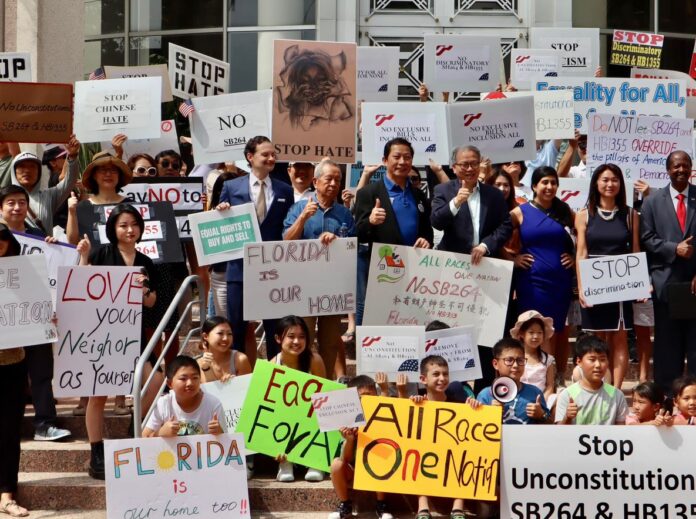by Akemi Tamanaha, Associate Editor
Jessica, a Chinese data scientist living in the United States on an H1B visa, has spent the past six years building a life in Florida. She had hoped to purchase a larger house for herself, her baby and her parents, who wanted to help raise their grandchild. The recent passage of a discriminatory land law (SB 264) makes that dream nearly impossible.
SB 264, which went into effect on July 1, prohibits any person from one of the seven “foreign countries of concern” from purchasing agricultural land or real property near a military base but has more specific restrictions for Chinese citizens.
The law states that Chinese people who are not U.S. citizens or lawful permanent residents of the U.S. are prohibited from purchasing real property in Florida.
Now, Jessica must decide whether to remain or uproot the life she spent half a decade building to move to a different state.
For months, rallies and protests have been held against SB 264. On Tuesday, the Florida Asian American Justice Alliance and Florida State Representative Fentrice Driskell hosted a virtual town hall meeting to help Jessica and other Chinese people share their stories.
Advocates, lawyers and state lawmakers also discussed the law’s intimidating criminal penalties and confusing language.
The real people impacted by SB 264
SB 264 has already forced several Chinese citizens who have lived in the U.S. for years to adjust their plans.
Jin, an H1B visa holder working at a bank in Tampa, had been planning to buy a small property closer to his job to avoid the one-hour commute. During the pandemic, he was allowed to work remotely full-time but now must go into the office at least twice a week.
“I think the new legislation definitely makes everything very inconvenient for me and a lot of my other fellow Chinese coworkers at the bank,” Jin said.
Jin has been living in the U.S. for over a decade. He moved to California on a student visa in 2010 and relocated to Florida after completing his bachelor’s and master’s degrees. Now, like Jessica, he is considering another move.
“We believe it will be a big loss for Florida on retaining and attracting great talents,” Jessica said.
The law has also impacted businesses as well as individuals. Terry owns a wood door and flooring business that has been growing rapidly over the years. The business had planned to buy a bigger warehouse in Florida but must now look at other states like Georgia and Texas.
A law that specifically discriminates against Chinese citizens and potentially all Asian Americans
In addition to tougher restrictions, SB 264 also inflicts stricter criminal penalties for Chinese people who unlawfully purchase real property and for the people who sell to them.
According to Florida attorney Hongwei Shang, buyers and sellers who violate SB 264 could be charged with a second-degree misdemeanor, but Chinese purchases who violate the law could face third-degree felony charges. It is also considered a first-degree misdemeanor to unlawfully sell to Chinese buyers.
This puts realtors in the uncomfortable position of having to determine whether or not potential buyers can legally purchase a property themselves.
“How am I going to ask the buyer who I don’t know that well say, ‘Hey, do you have a green card? Do you have, you know, American citizenship?’ I cannot because this is totally against the privacy,” Gloria Chu, who has been working as a broker and real estate agent in Florida for over 15 years, said.
Advocates also worry that the tough criminal penalties could lead to discrimination against all Asian American homebuyers. Sellers may question people because they look Chinese.
Confusing “on purpose”
Lawyers, lawmakers and advocates are working to help those impacted by SB 264, but it’s difficult to know where to start. A common criticism of the bill at the town hall was that it is intentionally vague.
SB 264, for example, says a person who is “domiciled in China” but not a U.S. citizen or lawful permanent resident of the U.S. can not purchase real property. But what does domiciled mean?
According to attorney Clayton Zhu, not even federal courts have the answer. When the motion for preliminary injunction was heard two months ago, the U.S. District Court and the state of Florida could not agree on a definition for domiciled.
FAAJA founder Echo King wondered aloud during the town hall whether a Chinese citizen who held a green card in a country like Canada would still be considered “domiciled” in China. Lawmakers did not have answers for her.
It could also be difficult for a person from a foreign country of concern to figure out whether a property is within a 10-mile radius of a military installation or critical infrastructure. According to Zhu, military bases are often large properties, and it’s unclear what the law means by critical infrastructure.
Zhu’s law firm, DeHeng Law, retained a geographic information systems expert to create a map that would highlight potential exclusion zones in red. They based the map on military bases and five different types of critical infrastructures. The finished map was almost completely red.

The restriction does not necessarily impact Chinese citizens, who are restricted not by the location of the property but by their residency and citizenship status. However, a person from the Democratic People’s Republic of Korea, one of the seven “foreign countries of concern,” will have to determine whether a potential property falls into an exclusion zone. A process that could be difficult for the average person.
Rep. Driskell said the vague guidelines were intentional.
“It’s designed to intimidate, to create fear and to make it very confusing what to do and to potentially catch people up in this legal dragnet,” Rep. Driskell said.
Constitution Challenge
According to lawyers at the town hall, one direct course of action is a constitutional challenge. Florida attorney Melissa Vickers said she believes the law violates the 14th Amendment “for the equal protection and due process rights of people.” Several speakers at the town hall also said they believe it violates the Fair Housing Act of 1968.
Four Chinese people who live in Florida have already filed a lawsuit against SB 264 arguing that it violates both the 14th Amendment and the Fair Housing Act. The plaintiffs are being represented by the ACLU, the ACLU of Florida, DeHeng Law Offices PC, and the Asian American Legal Defense and Education Fund (AALDEF)
Vickers predicts that their lawsuit won’t be the last.
AsAmNews is published by the non-profit, Asian American Media Inc.
We are supported through donations and such charitable organizations as the Robert Wood Johnson Foundation. This holiday season, double your impact by making a tax-deductible donation to Asian American Media Inc and AsAmNews. Thanks to an additional benefactor, all donations will now be matched up to a total of $12,000.
Please also follow us on Instagram, TikTok, Facebook, YouTube and X.


